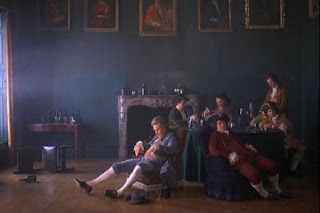 Wong Kar-wai's fifth feature, Fallen Angels, picks up from the massive success of the previous year's Chungking Express in mood and theme, reinforcing the continuity by having Takeshi Kaneshiro reprise his character in name and quirkily memorable motif from that film: he has now actually gone mute from eating a tin of pineapples past its sell-by. That this only superficially ties the character to his previous incarnation is in keeping with the mercurial, ephemeral nature of the quintet of the unrequited fallen in this episode. They flutter around each other and Christopher Doyle's hyperreal rain-and-neon Hong Kong like moths, detached yet feeling a longing for something they can't pin down.
Wong Kar-wai's fifth feature, Fallen Angels, picks up from the massive success of the previous year's Chungking Express in mood and theme, reinforcing the continuity by having Takeshi Kaneshiro reprise his character in name and quirkily memorable motif from that film: he has now actually gone mute from eating a tin of pineapples past its sell-by. That this only superficially ties the character to his previous incarnation is in keeping with the mercurial, ephemeral nature of the quintet of the unrequited fallen in this episode. They flutter around each other and Christopher Doyle's hyperreal rain-and-neon Hong Kong like moths, detached yet feeling a longing for something they can't pin down. Doyle's camera wheels and tilts as restlessly as the gratingly ADHD women that populate Kar-wai's films and there's a crutch-like reliance on voice-over narrative and a driving soundtrack to pressgang responses. But, out of the stylised sensory overload, real content does emerge unexpectedly and curiously: it leaves emotional echoes like a retinal imprint of fireworks, that linger after the flimsy plot of hawkers and hitmen has been washed away.
6/10
















